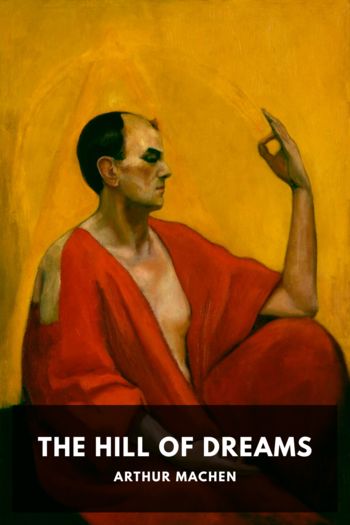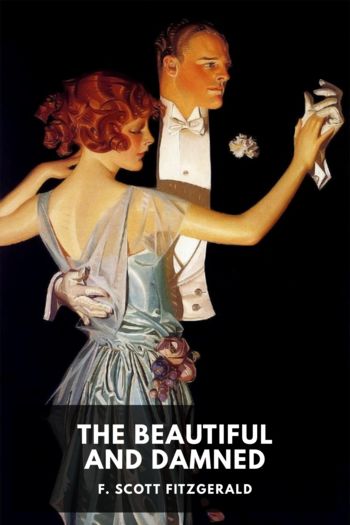The Hill of Dreams by Arthur Machen (best books for students to read .txt) 📕

- Author: Arthur Machen
Book online «The Hill of Dreams by Arthur Machen (best books for students to read .txt) 📕». Author Arthur Machen
his mind that was charmed by such passages, for he felt at the same time a strange and delicious bodily languor that held him motionless, without the desire or power to stir from his seat. And there were certain phrases in “Kubla Khan” that had such a magic that he would sometimes wake up, as it were, to the consciousness that he had been lying on the bed or sitting in the chair by the bureau, repeating a single line over and over again for two or three hours. Yet he knew perfectly well that he had not been really asleep; a little effort recalled a constant impression of the wallpaper, with its pink flowers on a buff ground, and of the muslin-curtained window, letting in the grey winter light. He had been some seven months in London when this odd experience first occurred to him. The day opened dreary and cold and clear, with a gusty and restless wind whirling round the corner of the street, and lifting the dead leaves and scraps of paper that littered the roadway into eddying mounting circles, as if a storm of black rain were to come. Lucian had sat late the night before, and rose in the morning feeling weary and listless and heavy-headed. While he dressed, his legs dragged him as with weights, and he staggered and nearly fell in bending down to the mat outside for his tea-tray. He lit the spirit lamp on the hearth with shaking, unsteady hands, and could scarcely pour out the tea when it was ready. A delicate cup of tea was one of his few luxuries; he was fond of the strange flavor of the green leaf, and this morning he drank the straw-coloured liquid eagerly, hoping it would disperse the cloud of languor. He tried his best to coerce himself into the sense of vigor and enjoyment with which he usually began the day, walking briskly up and down and arranging his papers in order. But he could not free himself from depression; even as he opened the dear bureau a wave of melancholy came upon him, and he began to ask himself whether he were not pursuing a vain dream, searching for treasures that had no existence. He drew out his cousin’s letter and read it again, sadly enough. After all there was a good deal of truth in what she said; he had “overrated” his powers, he had no friends, no real education. He began to count up the months since he had come to London; he had received his two thousand pounds in March, and in May he had said goodbye to the woods and to the dear and friendly paths. May, June, July, August, September, October, November, and half of December had gone by; and what had he to show? Nothing but the experiment, the attempt, futile scribblings which had no end nor shining purpose. There was nothing in his desk that he could produce as evidence of his capacity, no fragment even of accomplishment. It was a thought of intense bitterness, but it seemed as if the barbarians were in the right—a place in a house of business would have been more suitable. He leaned his head on his desk overwhelmed with the severity of his own judgment. He tried to comfort himself again by the thought of all the hours of happy enthusiasm he had spent amongst his papers, working for a great idea with infinite patience. He recalled to mind something that he had always tried to keep in the background of his hopes, the foundation-stone of his life, which he had hidden out of sight. Deep in his heart was the hope that he might one day write a valiant book; he scarcely dared to entertain the aspiration, he felt his incapacity too deeply, but yet this longing was the foundation of all his painful and patient effort. This he had proposed in secret to himself, that if he laboured without ceasing, without tiring, he might produce something which would at all events be art, which would stand wholly apart from the objects shaped like books, printed with printers’ ink, and called by the name of books that he had read. Giotto, he knew, was a painter, and the man who imitated walnut-wood on the deal doors opposite was a painter, and he had wished to be a very humble pupil in the class of the former. It was better, he thought, to fail in attempting exquisite things than to succeed in the department of the utterly contemptible; he had vowed he would be the dunce of Cervantes’s school rather than top-boy in the academy of A Bad Un to Beat and Millicent’s Marriage. And with this purpose he had devoted himself to laborious and joyous years, so that however mean his capacity, the pains should not be wanting. He tried now to rouse himself from a growing misery by the recollection of this high aim, but it all seemed hopeless vanity. He looked out into the grey street, and it stood a symbol of his life, chill and dreary and grey and vexed with a horrible wind. There were the dull inhabitants of the quarter going about their common business; a man was crying “mackerel” in a doleful voice, slowly passing up the street, and staring into the white-curtained “parlours,” searching for the face of a purchaser behind the India-rubber plants, stuffed birds, and piles of gaudy gilt books that adorned the windows. One of the blistered doors over the way banged, and a woman came scurrying out on some errand, and the garden gate shrieked two melancholy notes as she opened it and let it swing back after her. The little patches called gardens were mostly untilled, uncared for, squares of slimy moss, dotted with clumps of coarse ugly grass, but here and there were the blackened and rotting remains of sunflowers and marigolds. And beyond, he knew, stretched the labyrinth
Free e-book «The Hill of Dreams by Arthur Machen (best books for students to read .txt) 📕» - read online now
Similar e-books:





Comments (0)